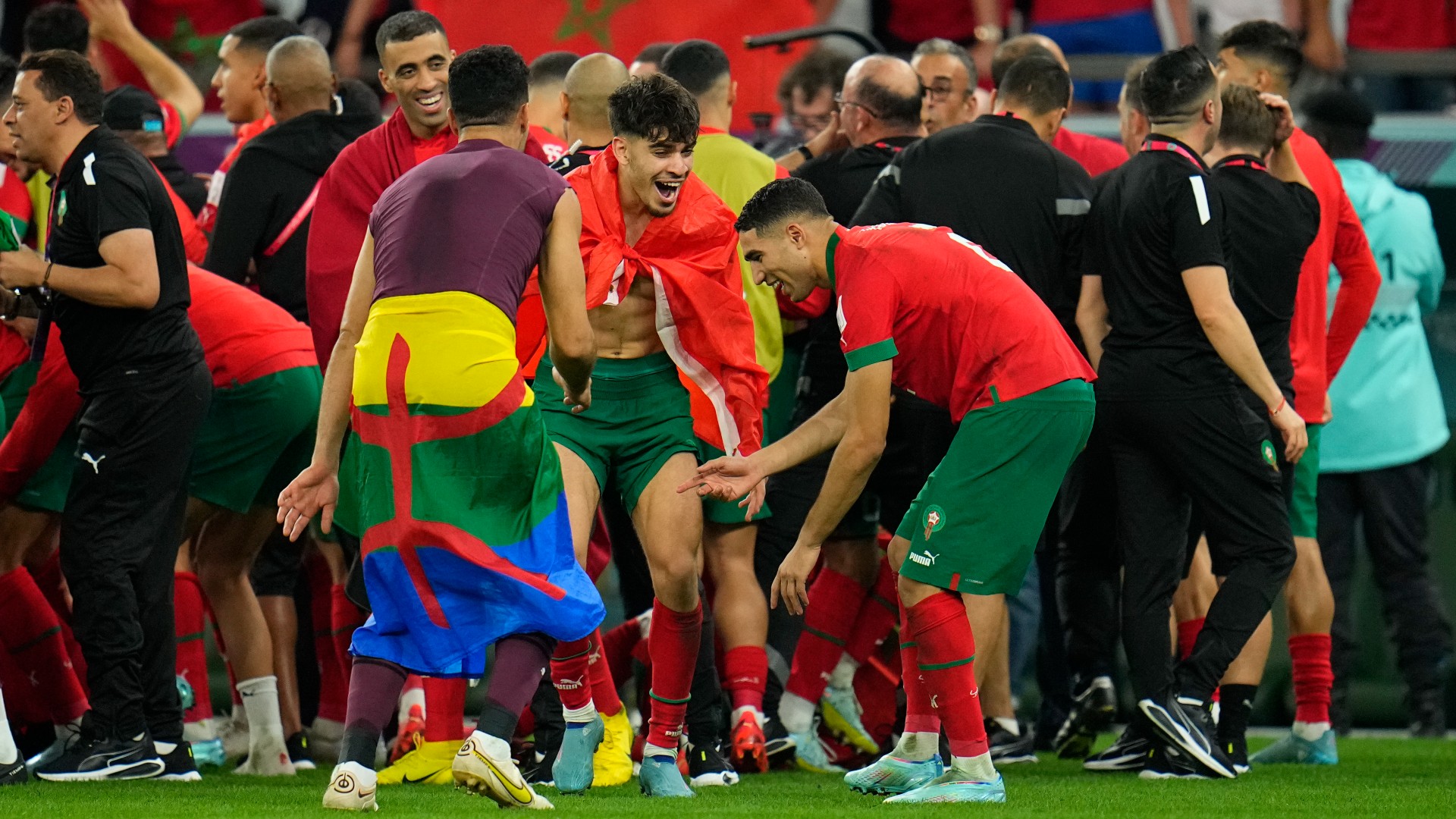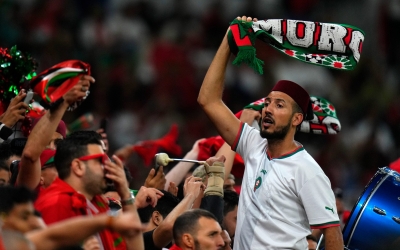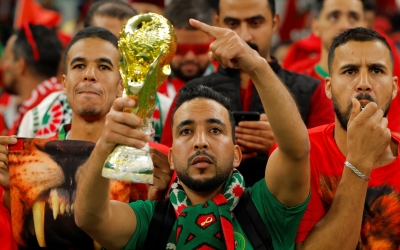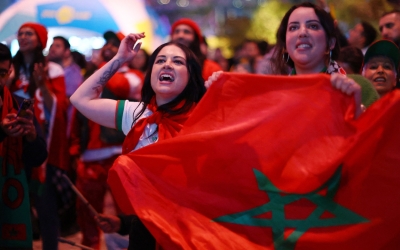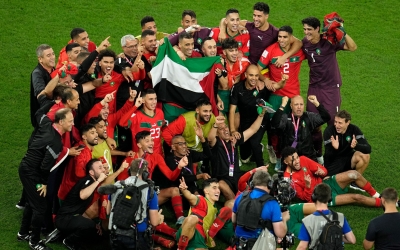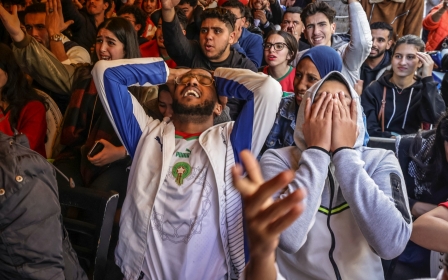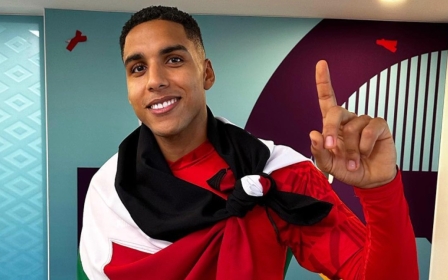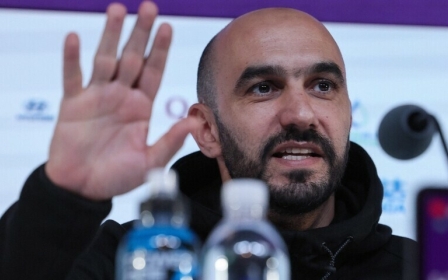World Cup 2022: Morocco's success sparks debate about Amazigh erasure
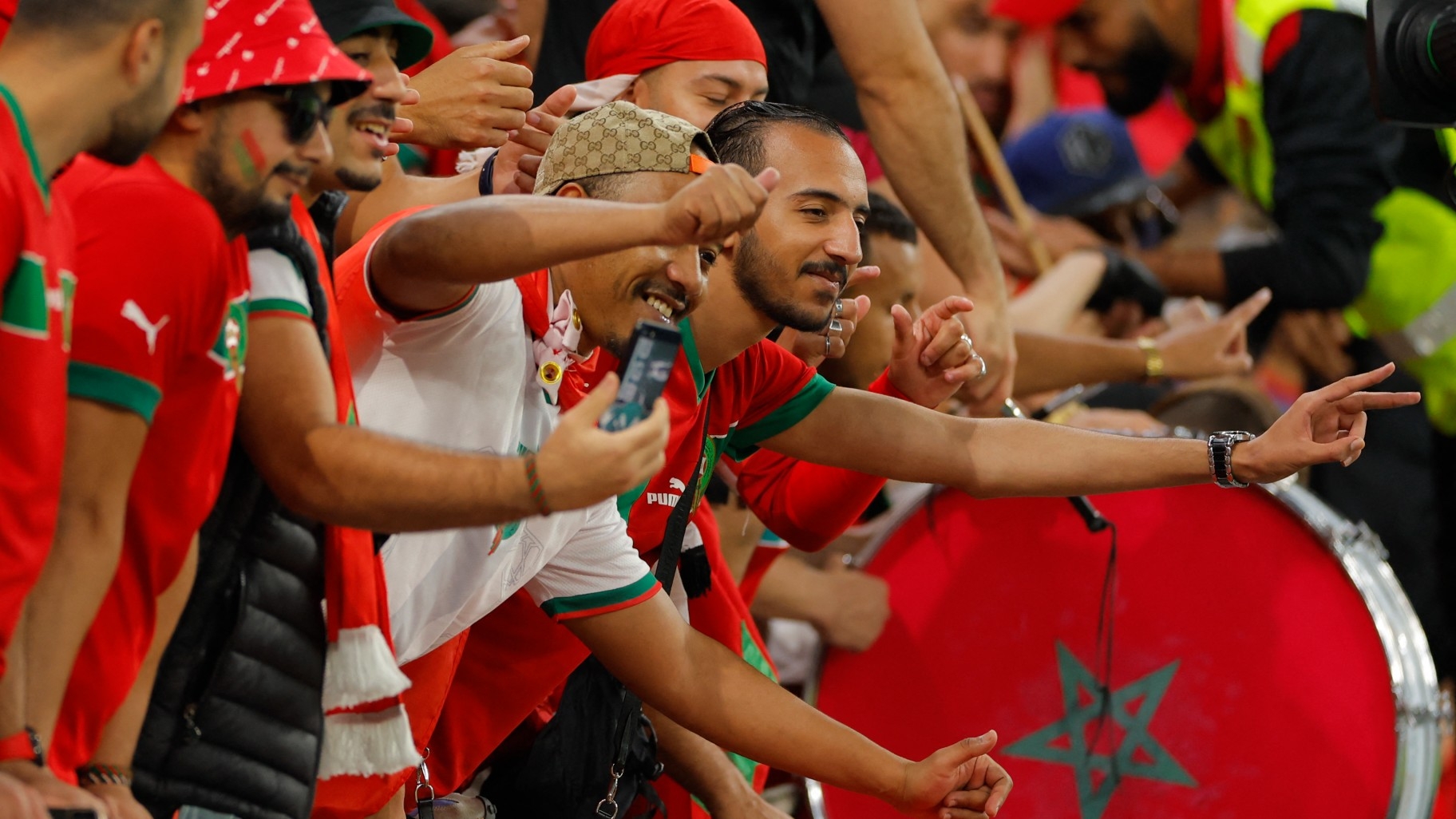
The Qatar World Cup has been a tournament of many firsts.
It's the first to be hosted in the Middle East, the first to be held outside of the traditional European summer and the first to feature an Arab and African team in the semi-finals.
For fans from countries across the region, it's presented an opportunity for a generally underrepresented footballing region to be seen and heard.
'Morocco's wins brought back a feeling of a united Muslim ummah and Arab world'
- Adnan El Khattate, Agadir-based doctor
Supporting each other's success has been a central theme in Qatar, with Muslim unity and pan-Arabism transcending national boundaries and local antagonisms.
But in the run-up to giant-killing Morocco's semi-final clash against France, some fans have debated whether Morocco's success is being usurped by others.
New MEE newsletter: Jerusalem Dispatch
Sign up to get the latest insights and analysis on Israel-Palestine, alongside Turkey Unpacked and other MEE newsletters
After the Atlas Lions bested Portugal on Saturday and clinched a spot as the first country in Africa and the Arab world to advance to the semifinals of the FIFA World Cup, New York's Moroccan-American community flocked to Times Square to celebrate.
Oualid Majdoubi, a nurse who moved from the Moroccan city of Oujda to New York at age five, adorned himself in the kingdom's national colours and posed with a flag.
But it wasn't Morocco's.
He was carrying the tricolour long associated with the Amazigh, a North African indigenous people also known as Berbers.
Amazighs account for a substantial portion of Morocco's population and its diaspora, as Majdoubi saw when he spotted Amazigh tricolours floating among the sea of Moroccan and Palestinian flags in Times Square.
"I felt like I was home with my brothers and sisters and cousins celebrating a family wedding," he told Middle East Eye.
But the Amazigh flag made its most prominent World Cup appearance after Morocco's quarter-final victory over Spain.
While the Atlas Lions, the kingdom's national football team, were propping up a Palestinian flag for a post-match show of solidarity at Education City Stadium in Qatar, goalkeeper Munir Mohamedi wore the Amazigh tricolour around his waist.
The Atlas Lions' Amazigh fans heralded the moment on social media, with the Twitter user @histoirerifaine captioning a picture of Mohamedi: "The Berbers are making history today!"
Gwyneth Talley, an assistant professor of anthropology at the American University of Cairo, challenged the claim that Moroccans see themselves as "the first 'Arab' and 'African' country" to reach the semi-finals.
"If you talk to Moroccans on the street, their nationality as Moroccan or identity as Amazigh is considered first," said Talley.
Some of the Atlas Lions' most famous players, though born outside Morocco, have Amazigh roots. They include midfielders Hakim Ziyech, Selim Amallah, and Sofyan Amrabat.
Despite the multiethnic makeup of the Atlas Lions and Morocco itself, journalists inside and outside the kingdom, like many fans, often simplify the footballers as an “Arab team”.
"Amazigh identity is proud and hard-won in the eyes of Morocco as a nation-state, especially in the past decade," said Talley. "It is understandable that they want to be recognised as Moroccan or Amazigh first and an Arab nation somewhere down the list."
'Core of our identity'
The Amazigh define themselves as the original inhabitants of Morocco and North Africa, tracing their presence in the region back millennia, while Arabs arrived with the Islamic conquest of the Maghreb in the seventh and eighth centuries.
Morocco's most recent census, conducted in 2014, determined that 27 percent of the population spoke an Amazigh language. But estimates of the number of Moroccans who claim Amazigh heritage go as high as 70 percent.
Nonetheless, Morocco's Arabised monarchy often suppressed expressions of Amazigh national identity in the decades after the kingdom’s 1956 independence from France, a cultural policy that peaked under King Hassan II in the 1980s and 1990s.
The kingdom only reversed course when Mohammed VI, the current monarch, ascended the throne in 1999. The new king opened the Royal Institute of Amazigh Culture in 2001 and recognised Tamazight as an official language in 2011.
Still, discrimination persists in subtler forms, such as limitations on Moroccans’ ability to take Amazigh names, rather than Arab ones.
Islam Aatfaoui, the communications manager for an environmental organisation in the inland Moroccan city of Sefrou, said: "The Amazigh are the core of our Moroccan identity and, like every ethnic community that's part of Morocco, it’s a pleasure and a source of pride to see our national team go down in history."
Many Moroccans see the minimisation of their country’s Amazigh heritage at the World Cup as yet another example.
"The entire external debate has focused on whether Morocco is an African or an Arab representative," Aatfaoui told MEE.
"This has led the Amazigh community to question, once again, all the discrimination and marginalisation it has faced and must face all the time."
Amazigh fans and activists alike have responded by championing the Atlas Lions as a symbol of their national identity - a push that has resonated far outside Morocco's borders.
"It means a lot to me, as a non-Moroccan Amazigh, to see Morocco having its glory days, and to see our flag everywhere," said Helena Boutalbi, a student from Algeria’s Amazigh Kabylia region who lives in the French city of Le Havre.
Boutalbi emphasised the Atlas Lions’ appeal to Amazighs across the world, pointing to the Instagram account dz_kabylifornie's celebrations of the Amazigh tricolour’s appearances at the World Cup.
"Without this important symbol, the media and public have not been aware of the Amazigh identity that is a big part of the Morocco squad as well as the fan base," said Talley, the professor in Cairo.
Amazigh pride, Arab nationalism
Many of the Atlas Lions' fans, however, see their winning streak at the World Cup as first and foremost a historic moment for Arabs.
Houda El Mamouni, Boutalbi's Moroccan classmate in Le Havre, counts herself among them.
"For me as an Arab, it's a huge success and the biggest source of pride," Mamouni told MEE.
Morocco, which joined the Arab League just two years after independence, attaches political and religious import to Arab cultural identity. The king, like many Moroccans, traces his lineage and much of his legitimacy back to the prophet Muhammad, perhaps history’s most famous Arab.
Data on the precise size of the kingdom's Arab community remains limited, but a 2019 study concluded that a majority of Moroccans adhere to "Arab cultural traditions".
Adnan El Khattate, a doctor in the southern Moroccan city of Agadir, said that Morocco's wins "brought back a feeling of a united Muslim ummah and Arab world," a sentiment shared by at least some of the Atlas Lions themselves.
After Morocco beat Spain, Atlas Lions forward Sofiane Boufal gave his thanks not only to Moroccan fans but also "to all Arab people," adding, "This win belongs to you."
Some of the Atlas Lions’ fans reject Amazigh criticism of the team’s portrayal as an Arab institution. Hala Daho-Idrissi, a pharmacist in Casablanca, Morocco’s largest city, dismissed complaints of Arabisation as “totally wrong”.
"We can't get 'Arabised' if we're already Arabs," agreed El Mamouni, the Moroccan student in France.
"Whether they agree or not, we're African Arabs."
Ethnic tensions on and off the field
For Morocco, disagreements over national identity have become a recurring feature of the World Cup.
El Mamouni recalled a scuffle between two Moroccan fans in Le Havre after the Atlas Lions' win over Belgium. She said that one fan brandished the Amazigh flag, as the other tried to wrestle it from him.
In late November, a video emerged of Qatari police trying to seize an Amazigh tricolour from Moroccan fans. The police appeared to confuse it with the pride flag, which Qatari authorities have blocked fans from displaying at the tournament.
These types of incidents predate the World Cup, sometimes ensnaring players.
'This team summarises the history of a country, the history of those who left and those who stayed'
- Khalid Mouna, Moulay Ismail University in Meknes
In 2020, Atlas Lions forward Munir El Haddadi, then affiliated with FC Sevilla, wore an Amazigh tricolour to celebrate his club's win.
The website Hiba Press then criticized him for opting to show the Amazigh flag over its Moroccan counterpart, calling on Haddadi to "have a little respect for the country that saw the birth of his whole family".
Discrimination against the Atlas Lions' Amazigh players also manifests in less obvious ways.
When an interviewer insisted that Mohamedi, the Atlas Lions goalkeeper, answer a question in Arabic, the footballer asked whether he could instead respond in Tarifit, an Amazigh dialect.
"We can see unfortunately that Moroccan journalists ask questions in Arabic to players, especially from the diaspora, who only speak their mother tongue, Berber," said Khalid Mouna, a professor of anthropology at Moulay Ismail University in Meknes.
"This shows that the denial of the Amazigh identity is still there, revealed by football."
A melting pot
But a growing number of fans appear eager to leave behind the baggage of identity politics.
"Far from politics, everyone can see how united we are as Moroccans, Arabs, Africans, and Muslims," said Imane Mezraji, a student in the port city of Tangier.
While Mezraji identifies as Arab, she welcomed the display of Amazigh flags in Tangier during celebrations of Morocco's win over Spain.
Many Moroccans see themselves as a mix of Amazigh and Arab, complicating attempts by any ethnic group to monopolise the Atlas Lions’ series of triumphs.
"It's a victory for Morocco," said Malak Naili, a retailer in the coastal city of Mohammedia who claims Arab and Amazigh heritage. "Whoever wants to celebrate with us is free to do so."
At a recent press conference, Atlas Lions head coach Walid Regragui expressed frustration with the assignment of ethnic labels to the team. When a journalist inquired whether the Atlas Lions represented the Arab world, Regragui retorted: "I'm not a politician."
A wide range of the Atlas Lions’ fans view their success as a source of pride for all Moroccans, regardless of ethnicity.
"It's become a personal win for us all," said Rita Kamale, a musician who splits her time between Casablanca and London. "This is bigger than football.”
Mouna, the professor in Meknes, suggested that the Atlas Lions' resonance transcends identity politics.
"In the Moroccan context, it is not Arab or Amazigh identity that is at the centre, but rather a beautiful union between the sons of migrants and players born and trained in Morocco," he told MEE.
"This team summarises the history of a country, the history of those who left and those who stayed."
This article is available in French on Middle East Eye French edition.
Middle East Eye delivers independent and unrivalled coverage and analysis of the Middle East, North Africa and beyond. To learn more about republishing this content and the associated fees, please fill out this form. More about MEE can be found here.


